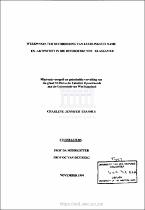| dc.contributor.advisor | Meerkotter, DA | |
| dc.contributor.author | Erasmus, Charlene Jennifer | |
| dc.date.accessioned | 2023-03-03T09:45:34Z | |
| dc.date.available | 2023-03-03T09:45:34Z | |
| dc.date.issued | 1994 | |
| dc.identifier.uri | http://hdl.handle.net/11394/9682 | |
| dc.description | Magister Educationis - MEd | en_US |
| dc.description.abstract | This thesis documen6 and analyses an action research project undertaken in my Secondary School Home Economics classroom in 1993. The purposes of the project were to investigate and attempt to change my teaching - so that my students could be empowered to take greater control over their own lives - by means of the greater use of the students **" of knowledge, by enhancing student involvement in and responsibility for the teaching-learning situation, by promoting a positive attitude towards learning on the part of the students, and by encouraging critical thinking. Chapter I provides a short historical overview of the events leading to the launching of the projecL and a discussion of the complexities of educating for democracy and change. In Chapter 2 I discuss my search for and choice of an appropriate research methodolory. Referring to positivistic, interpretive and critical or emancipatory research paradigms and approaches, I focus on the potential of action research to serve as a research approach in the critical mode. Chapters 3 and 4 deal with my attempts to change the way t taught to promote the aims of my project. Attempting to move away from my traditional style of teaching I proceeded to
experiment with a range of other teaching strategies - groupwork, demonstration lessons, student presentations and team teaching - and to monitor their initial effect on the dynamics of the classroom and the learning of the students. The thesis suggests that change is complex and that, in order for it to be successful, it will have to involve all participants in a real way. Further, that's a shift away from traditional transmission modes of teaching bring about a change in the way the participants view their school work and in their ability to seek to influence their own lives more generally. Finally, that action research provides a useful strategy for the teacher who is concerned to teach in a more empowering way, and certainly in such a traditional field as Home Economics. | en_US |
| dc.language.iso | en | en_US |
| dc.publisher | University of the Western Cape | en_US |
| dc.subject | Participants | en_US |
| dc.subject | Teaching strategies | en_US |
| dc.subject | Positivistic | en_US |
| dc.subject | Interpretive and critical | en_US |
| dc.subject | Emancipatory | en_US |
| dc.subject | Groupwork | en_US |
| dc.title | Werkwyses ter bevordering van leerlingdeelname en -aktiwtiet in die huishoudkunde klaskamer | en_US |
| dc.rights.holder | University of the Western Cape | en_US |

